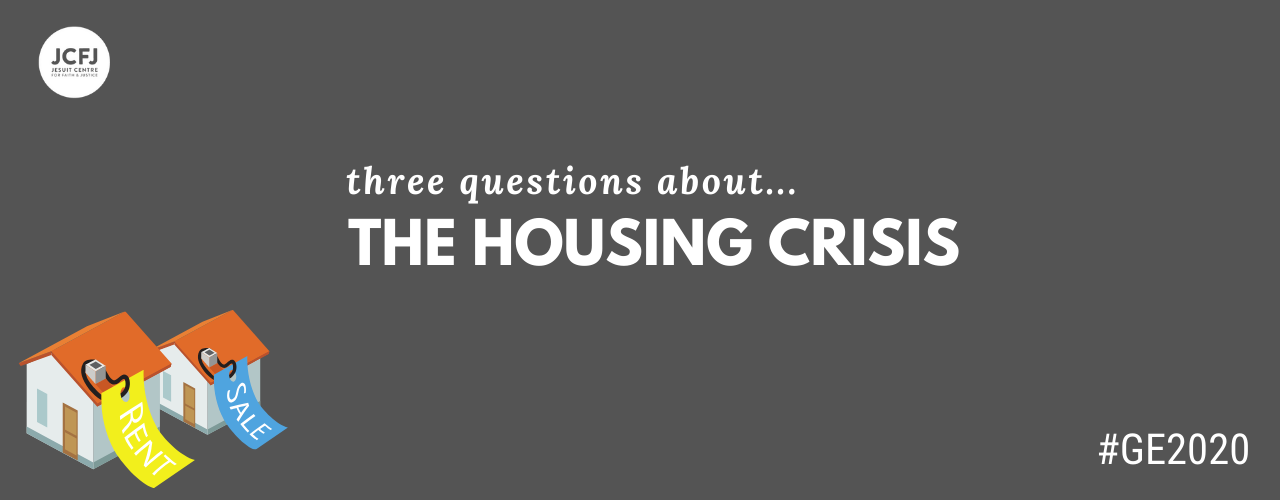
The Irish housing and homelessness crisis is a crucial election issue. In this guide to the topic, our Social Justice Advocate, Keith Adams says our incoming politicians need to answer questions about expenditure and payments to private landlords, as well as their position on the right to housing.
3 Things You Need to Know
- By the date of the general election, the number of homeless adults and children will be over 10,000. 3,752 children have been recorded as homeless and the fastest-growing group of people who find themselves without a home are the over-65s.
- Standard economic advice holds that housing should consume about 30% of income. One in ten households in the private rental sector is paying more than 60% of its income on rent. The average rent in Dublin is now over €2,000 per month. This is double the average rent in late 2010.
- When the Government states that it has drastically increased the availability of social housing, remember that two-thirds of the new social housing places are funded by the Housing Assistance Payment (a rent subsidy to private landlords). This is not social housing. It is private housing, temporarily recategorised. Over the past four years, the Government has paid over €2.5 billion euro to private landlords through rent subsidisation and leasing.
3 Questions to Ask Yourself
- In one of the wealthiest countries in the world, with an economy which is statistically booming, how can the homeless figures be getting worse instead of improving?
- Are your wages increasing at the same speed as the cost of housing? Does this suggest you are facing a future you can look forward to?
- Our current Government has promoted itself as ‘prudent’ with our taxes. If you spent over €2.5 billion on meeting people’s housing needs, would you not expect to own some houses, instead of your money simply accruing to landlords? If you spent that much money and the problem continued to worsen, at what point would you admit that you needed new ideas?
3 Questions You Need to Ask Politicians
- Do you support adding a right to housing to the Irish Constitution?
- I understand public housing to consist of a mix of different types of homes, cost-rental, social rental, and affordable private for those who wish to buy. Do you support the building of public housing on public land?
- We, as a country, have spent over 2.5 billion euro in the past four years on subsidising rents in the private market for social housing? How do you feel about this? What is your plan for the future of social housing?
3 Things Politicians Might Say
- “Adding a right to housing to the Constitution will not build a single additional home”
This is a common response when politicians are pressed on this issue. It is true that an amendment to the Constitution will not provide an additional home. But what it would do is provide a legal basis to hold Governments accountable when they fail to meet people’s most basic needs. - “We don’t want small landlords to leave the rental market and reduce the number of properties available”
The image of a landlord which we are often presented with is the “accidental landlord” whose inherited a property or upsized due to family needs. While these landlords naturally exist in any housing market, Government policy has created the environment for two significant changes to the profile of landlords. Firstly, the introduction of large institutional investors who have seen the opportunity for high returns on investment in the Irish market. Secondly, the properties owned by these small landlords do not disappear. Rather, they move from renting out houses to families to capitalise on short-term letting arrangements. In the midst of a homelessness crisis, there are around 5,000 properties to let on AirBnB. - “Renting in the private rental market was needed in the short-term as it takes time to build houses”
Ireland is currently able to borrow money on the international money markets for zero or negative interest to fund the building of publicly-owned housing (social rental, cost-rental homes, and affordable private homes) on publicly-owned land. The decision not to do so is ideological rather than merely pragmatic, as is claimed. The Government, as the owner of the land and the commissioner of the funding, is able to establish the terms of a large-scale scheme to meet people’s housing needs.

